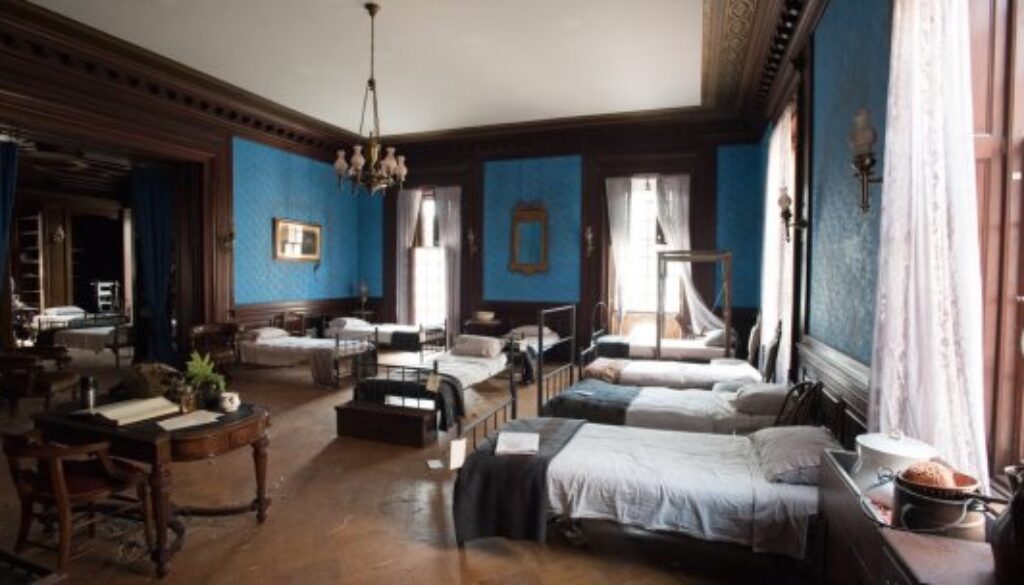Chad Darnell & The Extras Of ‘Mercy Street’
(This was an unpublished Columbia School of Journalism class assignment featured on TheOuterhaven.net on Feb. 21, 2016)

As “Mercy Street” is set to air the season finale tonight on PBS, one of the most striking features of this season has been the extras. Curiosity about the extras casting process led to a conversation with Chad Darnell. He was in charge of finding the actors in the willing to be extras in the hospital interior and exterior scenes.
Around 300 extras in the Richmond and Petersburg Va. area were cast for “Mercy Street”. For four months, they played the soldiers, slaves, laborers and citizens in the town who support the political and medical dilemmas the main cast face.
Extras are critical in bringing life into the background of television shows and movies. Although anyone in theory can act as an extra, they have to fit the descriptions set by the director and creative team for the production. The extras casting director is in charge of finding the right actors to fill those descriptions. For instance, a crowd scene would require many actors of all backgrounds and ages. A scene set on a college campus would require extras that are 18 to 25 years old.
Darnell began his career as a casting director by accident. “No one goes to school for this,” he said. After a few years of child acting in the Atlanta metro area, he was cast in “I’ll Fly Away” in 1991. The director pulled him off set and into the office to assist on the phone with last minute casting phone calls. After the initial trial by fire, other producers in the area called on him to cast soap operas and independent movies.
In the days before online databases, portraits of actors with handwritten notes on sizes and phone numbers were kept in morgue drawers. The drawers were organized by age and race. Several months would often pass between actors sending in their headshots and Darnell calling them to appear on set. Every detail and direction was hashed out in a 20-minute phone conversation. “I can’t imagine working like that now,” Darnell said. He eventually moved to Los Angeles where he would work on casting many popular TV shows such as “Lost” and “Alias”.
Some of the extras Darnell cast for “Mercy Street” were already experienced in the challenges of filming a period drama because they worked on the AMC Revolutionary War drama “Turn”. For the larger battlefield and street scenes, college students filled in the crowds. One particular casting challenge for Darnell was to find amputees in the area. On one very awkward occasion, Darnell was driving around Richmond when he saw an amputee. He flagged him down and asked if he was willing to be an extra. HIPPA laws prevented him from calling hospitals directly.
Experts in military history and historical medicine were on set to ensure every scene is historically accurate as possible. Every costume and prop was vetted by multiple people before it was used in a scene. On one occasion, he observed a lesson given to the extras on how to handle one of the reproduced medical tools carefully. Darnell avoided casting anyone on “Mercy Street” with a reenactment background as an extra. Actors with no experience are more apt to follow directions on set. In the casting community, reenactors have a bad reputation for arguing and nitpicking creative decisions. Reviews of “Mercy Street” on reenactor and costume expert blogs picking apart tiny details such as ruffle placement prove this reputation.
“It was an elaborate game of human chess,” was the way Darnell described a typical day on the “Mercy Street” set. Each day extras would arrive early in the morning. Makeup and special effects, especially for the women was a several hour process. Many of the interior hospital scenes for the first three episodes were shot consecutively for consistency. If extras were upgraded to speaking parts, Darnell would have to quickly call in a replacement.
There were two instances when Darnell went from casting extras to becoming one himself. The first was when his earlier training in dancing was useful for scenes portraying a ball. The second was more unexpected. One day while he was eating a breakfast burrito when he got paged to report to the set. The director of the first episode suddenly realized one of the patients was in the wrong bed and they couldn’t move him. Darnell had to become an extra to ensure the scene remained in continuity. Prepping him for his role as an injured soldier wasn’t a smooth process. “They sent me back to makeup because I looked too pretty with the blood,” Darnell said. He spent the rest of that day in bed wrapped up in bandages and working from a laptop despite the period clothing.



